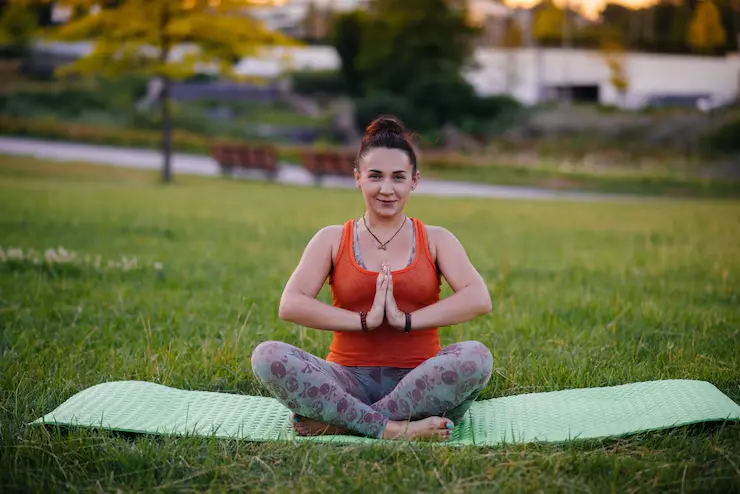Yoga is a holistic practice that encompasses physical postures (asanas), breath control (pranayama), meditation, and relaxation techniques. Regular practice of yoga has been shown to offer numerous health benefits, both physically and mentally.
Fildena 200 is a medication primarily used to treat erectile dysfunction (ED) in men. Here’s how yoga improves health:
Table of Contents
ToggleEnhances Flexibility and Strength
Yoga poses gently stretch and strengthen muscles throughout the body, improving flexibility, balance, and range of motion. Over time, regular practice can lead to increased suppleness and reduced muscle tension.
Yoga incorporates a wide range of stretching exercises that target different muscle groups and joints throughout the body.
Poses such as Forward Fold (Uttanasana), Downward-Facing Dog (Adho Mukha Svanasana), and Triangle Pose (Trikonasana) focus on lengthening muscles and increasing flexibility.
While Sildalist 120 doesn’t directly improve overall health, it can have positive effects on a man’s sexual health and quality of life by addressing ED, which can have psychological and relational impacts.
While yoga is often associated with flexibility, it also offers significant strength-building benefits. Many yoga poses require engaging and stabilizing various muscle groups to maintain proper alignment and balance.
By consistently practicing yoga, individuals can experience significant improvements in both flexibility and strength, leading to a more balanced and resilient body.
Whether you’re a beginner or a seasoned practitioner, yoga offers a versatile and accessible way to enhance physical fitness and overall well-being.
Promotes Cardiovascular Health
Certain yoga practices, such as Sun Salutations and Vinyasa flow sequences, can elevate the heart rate and improve cardiovascular health. Consistent practice may help lower blood pressure, reduce cholesterol levels, and improve circulation.
Dynamic styles of yoga, such as Vinyasa or Power Yoga, involve flowing sequences of poses coordinated with breath, which can elevate the heart rate and increase blood circulation throughout the body.
Poses like Sun Salutations (Surya Namaskar) and sequences that incorporate repetitive movements stimulate the cardiovascular system and improve cardiovascular fitness over time.
Yoga has been shown to help lower blood pressure and improve cholesterol levels, both of which are important factors in reducing the risk of cardiovascular disease.
Certain yoga practices, such as relaxation techniques and mindfulness meditation, promote stress reduction and relaxation, which can have a positive impact on blood pressure and cholesterol levels.
Heart rate variability (HRV) is a measure of the variation in time intervals between heartbeats and is an indicator of overall heart health and autonomic nervous system function.
Mindful breathing practices, such as pranayama, can enhance HRV by balancing the sympathetic and parasympathetic branches of the autonomic nervous system, leading to improved cardiovascular function and resilience.
Improves Respiratory Function
Pranayama, or yogic breathing techniques, focuses on conscious control of the breath. Deep breathing exercises can enhance lung capacity, increase oxygen intake, and improve respiratory efficiency. This can benefit individuals with respiratory conditions like asthma or chronic obstructive pulmonary disease (COPD).
Pranayama, or yogic breathing techniques, is a fundamental aspect of yoga practice. These techniques focus on conscious control of the breath to regulate and deepen breathing patterns.
Yoga poses, particularly chest-opening and back-bending poses, encourage expansion of the chest cavity and stretching of the intercostal muscles between the ribs.
Certain yoga poses require the engagement of the respiratory muscles, including the diaphragm and intercostal muscles, to support proper posture and alignment.
Mindfulness of breath is a key component of yoga practice. By cultivating awareness of the breath during yoga asanas and meditation, individuals learn to regulate and control their breathing patterns more effectively.
Regular yoga practice has been shown to benefit individuals with respiratory conditions such as asthma, chronic obstructive pulmonary disease (COPD), and bronchitis.
Reduces Stress and Anxiety
Yoga promotes relaxation and stress reduction through mindfulness techniques and conscious breathing. Regular practice can lower levels of the stress hormone cortisol, alleviate anxiety symptoms, and promote a sense of calm and well-being.
The practice of yoga involves gentle stretching, dynamic movements, and holding various postures (asanas). These physical activities help release tension and promote relaxation in the body, reducing the physical symptoms of stress.
Yoga incorporates mindfulness meditation practices that encourage present-moment awareness and non-judgmental observation of thoughts, feelings, and sensations.
By practicing mindfulness meditation, individuals learn to detach from stressful thoughts and worries, allowing them to experience a greater sense of peace and tranquility in the present moment.
Numerous studies have demonstrated the effectiveness of yoga in reducing symptoms of anxiety and depression. Yoga promotes the release of feel-good neurotransmitters like serotonin and dopamine, which can help alleviate symptoms of mood disorders.
The combination of physical movement, breathwork, and meditation in yoga provides a holistic approach to addressing the underlying causes of anxiety and depression, promoting mental and emotional well-being.
Enhances Mental Health
Yoga has been shown to have positive effects on mental health by reducing symptoms of depression, improving mood, and boosting overall psychological well-being. Mind-body practices like yoga help cultivate self-awareness, self-compassion, and resilience.
Yoga helps reduce stress by promoting relaxation and activating the body’s relaxation response.
Mindful movement, breathwork, and relaxation techniques in yoga help alleviate physical tension and calm the nervous system, reducing the effects of chronic stress on the body and mind.
Yoga provides tools for managing anxiety by fostering present-moment awareness and promoting relaxation.
Mindful breathing exercises and meditation techniques help individuals develop greater control over anxious thoughts and physiological symptoms of anxiety, leading to a greater sense of calmness and ease.
Regular yoga practice has been shown to improve mood and emotional well-being.
The combination of physical movement, breathwork, and meditation in yoga releases endorphins and other neurotransmitters that promote feelings of happiness, contentment, and relaxation.
Yoga helps individuals cultivate a positive outlook on life, build resilience, and cope more effectively with life’s challenges, leading to improved overall mood and emotional balance.
Boosts Immune Function
The gentle movements and breathwork of yoga can stimulate the lymphatic system, which plays a key role in immune function. Yoga practice may help strengthen the immune system, reduce inflammation, and support overall health and vitality.
Adequate sleep is essential for a healthy immune system. Yoga can help improve sleep quality by reducing stress and promoting relaxation, making it easier for individuals to fall asleep and stay asleep.
Practices such as restorative yoga and yoga nidra (yogic sleep) are particularly effective in promoting deep relaxation and facilitating restful sleep, which in turn supports immune function.
Certain yoga poses and sequences promote circulation throughout the body, delivering oxygen and nutrients to cells and tissues while flushing out toxins and waste products.
Poses that involve inversions, such as Legs-Up-the-Wall Pose (Viparita Karani) or Shoulder Stand (Sarvangasana), help improve blood flow to the lymphatic system, which plays a crucial role in immune function and the body’s defense against infections.
The lymphatic system is a key component of the immune system, responsible for filtering out toxins, waste, and pathogens from the body. Yoga poses that involve gentle twists, compressions, and movements stimulate lymphatic circulation and drainage.
Practices like Sun Salutations (Surya Namaskar) and dynamic yoga sequences help activate the lymphatic system and promote the movement of lymph fluid throughout the body, supporting immune function.
Improves Sleep Quality
Practicing yoga regularly has been associated with improved sleep quality and duration. Relaxation techniques and mindful breathing can help calm the mind and promote restful sleep, making it beneficial for individuals struggling with insomnia or sleep disturbances.
Mindfulness meditation practices, which are often incorporated into yoga sessions, help calm the mind and cultivate present-moment awareness.
By focusing attention on the breath or other sensations, individuals can quiet the chatter of the mind and create a peaceful mental state conducive to sleep.
Regular mindfulness meditation practice has been shown to improve sleep quality and reduce symptoms of insomnia by promoting relaxation and reducing arousal before bedtime.
Certain yoga poses and sequences are specifically designed to promote relaxation and prepare the body for sleep.
Gentle, restorative poses such as Child’s Pose (Balasana), Legs-Up-the-Wall Pose (Viparita Karani), and Corpse Pose (Savasana) can help release tension and induce a state of deep relaxation.
These poses help activate the parasympathetic nervous system, also known as the “rest and digest” system, which counteracts the body’s stress response and promotes relaxation and sleep.
Supports Digestive Health
Certain yoga poses, such as twists and forward bends, can massage the internal organs and improve digestion. Yoga practice may help alleviate digestive issues like bloating, constipation, and irritable bowel syndrome (IBS).
Fosters Mindfulness and Presence
Yoga encourages present-moment awareness and mindfulness, helping individuals cultivate a deeper connection to their bodies, minds, and surroundings. This heightened awareness can lead to greater clarity, focus, and emotional resilience in daily life.
Overall, yoga is a multifaceted practice that promotes holistic health and well-being. Whether you’re looking to improve physical fitness, reduce stress, or enhance mental clarity, incorporating yoga into your routine can offer a wide range of benefits for body, mind, and spirit.





